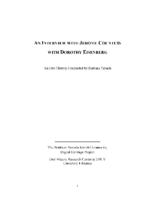Search the Special Collections and Archives Portal
Search Results

Transcript of interview with Arne Rosencrantz by Claytee White, February 9, 2010
Date
Archival Collection
Description
In this interview, focused on the John S. Park neighborhood of Las Vegas, Arne Rosencrantz discusses his childhood growing up in Las Vegas. He talks about local businesses, including his father's furniture store, as well as schools and churches in the neighborhood.
Arne Rosencrantz remembers living on Beverly Way from 1954 to 1970. Like so many others from that era, he attended Fifth Street School, John S. Park Elementary School, John C. Fremont Middle School and graduated from Las Vegas High School. As a Jew, he was in a small minority, but fondly recalls growing up in the dense Mormon population of John S. Park Neighborhood. As a youngster, life in Las Vegas was filled with fun. The desert provided opportunity to hunt lizards and rabbits. Kids walked to school without concern. They played ball and found the Strip casinos welcoming to locals. He tells how the social issue of segregation of the 1960s did not affect him personally, but how local movie theatre owner Lloyd Katz fought to make his Huntridge and Fremont theatres integrated. He also reminisces about his father opening Hollywood Furniture and later Garrett's Furniture, which Arne operated until retiring in 2001. During the interview, he lists other furniture companies and the strong assortment of other retailers and restaurants that served the neighborhood.
Text

Transcript of interview with Gilbert D. Yarchever by Claytee White, 2006
Date
Archival Collection
Description
Gilbert Yarchever was one of nine siblings, born and bred in Pittsburgh, Pennsylvania. He describes the way his mother?s family was granted the last name of ?Kurfeersf" by Emperor Franz Joseph (of Austria-Hungary), explains the Seder (the Jewish observation of the exodus of Hebrews from Egypt), and tells what it was like to survive the Depression. Gilbert describes the jobs he held after high school and the government examination he took that led to his lifetime of adventure and travel. He moved to Washington, D.C., in 1940 and kept himself busy working for the government and taking classes at George Washington University, as well as working part time at Hecht Department Store and as a freelance court reporter. Following the attack on Pearl Harbor in 1941, Gilbert was sent to Africa on a merchant ship, helped smuggle Jewish survivors into Jerusalem, and was assigned the task of negotiating with Arab sheikhs for laborers to build a road. In the years after that, he worked in Europe, Panama, Alaska, Japan, and Hawaii and describes many of the jobs he was responsible for and many of the individuals he met. He also married and had children, kept up with university classes whenever he could, and collected art objects and paintings. Following his retirement in 1977, Gilbert and his family came to Las Vegas and bought a condo in Regency Towers. He did some consulting work for a couple of years, and then he and his wife began traveling around the states and going abroad. He was involved with UNLV?s EXCEL program, the music department, and the Las Vegas Art Museum. (He and his second wife Edythe presented the first major exhibition on Holocaust art at the museum.) These days Gilbert often donates pieces from his art collection to churches, synagogues, and charitable organizations.
Gilbert Yarchever was in the Navy during World War II, helped smuggle Jewish refugees into Jerusalem, worked as a civil servant in many countries, and moved to Las Vegas in 1977. He helped found the EXCEL program at University of Nevada, Las Vegas and was an art collector with his wife, Edythe Katz-Yarchever.
Text

Transcript of interview with Andy Katz by Barbara Tabach, February 16, 2016
Date
Archival Collection
Description
In this interview, Andy Katz discusses his family, his childhood growing up in Las Vegas, and attending UNLV. His parents, Mike and Bea Katz, established Manpower, an employment agency, which Andy served as president.
Andy Katz is the youngest of four children born to Michael and Beatrice Katz. When Andy was a little over one-year-old his family moved from New York City to Las Vegas. During this oral history Andy highlights his family?s background and the entrepreneurial spirit of his father that inspired the move in 1963. By 1964, Mike Katz, Andy?s father, was well-known in Las Vegas for providing an answering service and subsequently for opening the Manpower franchise to serve the growing town. In time, this family business grew and the eldest sons, Bob and Mel opened franchises in Salt Lake City and San Diego, respectively. Andy recalls his steps to joining Manpower in this interview. With great humor and fondness, he describes the friendships he formed in public school, Hebrew school and Jewish youth organizations. Andy easily slipped into active leadership roles; it was a role he would continue during his years at UNLV, where he earned a Business degree and was active with the Alpha Epsilon Pi fraternity. Born Andrew Scott Katz on January 9, 1962, Andy, as everyone knew him, passed away suddenly on February 23, 2016. It was exactly one week after this oral history interview. The scheduled next session was not to occur.
Text

Transcript of interview with Mike and Susan Baller by Barbara Tabach, March 16, 2016
Date
Archival Collection
Description
In this interview, Mike and Susan Baller reflect upon their lives in Las Vegas, from growing up as teenagers amongst the tight-knit Jewish community, to mob influence on the city, and the impact of the city's growth. Mike shares stories about first arriving in Las Vegas to live, being a teenaged busboy at Binions Horseshoe to being related to Moe Dalitz -- in Michigan Mike drove a truck for the Dalitz dry cleaning business.
Text

Transcript of interview with Michael S. Mack by Barbara Tabach, May 20, 2015
Date
Archival Collection
Description
In this oral history Michael Mack discusses his early memories of Las Vegas such as attending the Fifth Street School and activities him and his friends participated in. The interview also includes his memories of different members of the Mack family and their activities. He reminisces about his many visits to the Flamingo Hotel as well as being taken by his parent to floor shows. He also discusses what it was like to grow up Jewish in Las Vegas and the way Jews helped build the community.
Text

Transcript of interview with Michael S. Mack by Claytee White, May 21, 2009
Date
Archival Collection
Description
During this interview, Michael Mack visualizes his childhood memories of the later 1930s, when Las Vegas was a small, but steadily growing, desert town. As he says, "The desert was our backyard." The Strip hotels like the last Frontier and the Flamingo pop into the stories, but it was basically an innocent time. He attended John S. Park Elementary when classrooms were temporary buildings from the local Air Force base and the neighborhood was filled with children. He still maintains close friendships from that time. And he also recalls friends from the Westside neighborhood. Michael talks of scouting, riding horses, and watching Helldorado parades.
Michael Mack's first recollection of Las Vegas is as a two-year-old living in a duplex on Bonneville Ave. Though the family moved several times, they remained in or near the John S. Park neighborhood. Michael's father was a Polish immigrant who arrived in Boulder City, where he opened a shoe store, in 1932. The building of the Hoover Dam brought opportunities and his father Louis expanded into the salvage business. In time Louis moved the family to Las Vegas, opened a retail clothing store, which eventually sold uniforms, and set up the first local bail bondman office. During this interview, Michael visualizes his childhood memories of the later 1930s, when Las Vegas was a small, but steadily growing, desert town. As he says, "The desert was our backyard." The Strip hotels like the last Frontier and the Flamingo pop into the stories, but it was basically an innocent time. He attended John S. Park Elementary when classrooms were temporary buildings from the local Air Force base and the neighborhood was filled with children. He still maintains close friendships from that time. And he also recalls friends from the Westside neighborhood. Michael talks of scouting, riding horses, and watching Helldorado parades. Though the Macks were a Jewish family, Michael's mother always brought the Christmas tree to school. It was a period when people memorized each other's 3-digit phone numbers, went to movies for 14 cents, and there was a ranch for people to stay while getting divorced. Halloween Trick-or-treaters in the John S. Park neighborhood might get a tasty cupcake or a shiny dime. Michael has a plethora of stories about innocent mischief and the unique experiences of a boy growing up in Las Vegas.
Text

Transcript of interview with Marc Ratner by Barbara Tabach, August 23, 2016
Date
Archival Collection
Description
Marc Ratner moved to Las Vegas when he was in the seventh grade in 1957. His father became owner of a retail beauty supply business. It also was about the time Marc became a bar mitzvah. The Ratner family belonged to Temple Beth Sholom, as did everyone at the time, and a favorite memory he recalls is of sneaking a glimpse of crooner Eddie Fisher and actress Elizabeth Taylor getting married there. While growing up, Marc showed no particular interest in being a star athlete. He played little baseball and participated in track as a long jumper. Nevertheless, on the day of this oral history interview, Marc is sitting in his office surrounded by sports memorabilia. It is all a testimony, a museum highlighting his decades of officiating and regulating sports events. His stories include newsworthy boxing episodes that ranged from the infamous ?Fan Man? parachutist incident in 1963 during the Evander Holyfield vs Riddick Bowe fight at Caesars and the 1997 ?Bite Fight? when Mike Tyson took a bite out of Evander Holyfield?s ear. v In 2016, Marc was inducted into the International Boxing Hall of Fame, an extraordinary honor for a nonparticipant. He has long been a fan of the sport and talks about the first fight he ever attended, becoming a ring inspector in 1985 and then starting a new phase of his career in 2006, as Vice President of Regulatory Affairs for the Ultimate Fighting Championship [UFC]. In addition, Marc has dedicated much his life blowing the whistle at high school and college sports: he?s officiated on the football field for several conferences, bowl games and mentors would-be officials. He served as Nevada State Athletic Commission executive director for two decades. Among his community involvement is serving on the board of Jewish Family Services Agency. In 1997 he was honored by the National Council of Christians and Jews. Marc Ratner moved to Las Vegas when he was in the seventh grade in 1957. His father became owner of a retail beauty supply business. It also was about the time Marc became a bar mitzvah. The Ratner family belonged to Temple Beth Sholom, as did everyone at the time, and a favorite memory he recalls is of sneaking a glimpse of crooner Eddie Fisher and actress Elizabeth Taylor getting married there. While growing up, Marc showed no particular interest in being a star athlete. He played little baseball and participated in track as a long jumper. Nevertheless, on the day of this oral history interview, Marc is sitting in his office surrounded by sports memorabilia. It is all a testimony, a museum highlighting his decades of officiating and regulating sports events. His stories include newsworthy boxing episodes that ranged from the infamous ?Fan Man? parachutist incident in 1963 during the Evander Holyfield vs Riddick Bowe fight at Caesars and the 1997 ?Bite Fight? when Mike Tyson took a bite out of Evander Holyfield?s ear. v In 2016, Marc was inducted into the International Boxing Hall of Fame, an extraordinary honor for a nonparticipant. He has long been a fan of the sport and talks about the first fight he ever attended, becoming a ring inspector in 1985 and then starting a new phase of his career in 2006, as Vice President of Regulatory Affairs for the Ultimate Fighting Championship [UFC]. In addition, Marc has dedicated much his life blowing the whistle at high school and college sports: he?s officiated on the football field for several conferences, bowl games and mentors would-be officials. He served as Nevada State Athletic Commission executive director for two decades. Among his community involvement is serving on the board of Jewish Family Services Agency. In 1997 he was honored by the National Council of Christians and Jews. Marc Ratner moved to Las Vegas when he was in the seventh grade in 1957. His father became owner of a retail beauty supply business. It also was about the time Marc became a bar mitzvah. The Ratner family belonged to Temple Beth Sholom, as did everyone at the time, and a favorite memory he recalls is of sneaking a glimpse of crooner Eddie Fisher and actress Elizabeth Taylor getting married there. While growing up, Marc showed no particular interest in being a star athlete. He played little baseball and participated in track as a long jumper. Nevertheless, on the day of this oral history interview, Marc is sitting in his office surrounded by sports memorabilia. It is all a testimony, a museum highlighting his decades of officiating and regulating sports events. His stories include newsworthy boxing episodes that ranged from the infamous ?Fan Man? parachutist incident in 1963 during the Evander Holyfield vs Riddick Bowe fight at Caesars and the 1997 ?Bite Fight? when Mike Tyson took a bite out of Evander Holyfield?s ear. v In 2016, Marc was inducted into the International Boxing Hall of Fame, an extraordinary honor for a nonparticipant. He has long been a fan of the sport and talks about the first fight he ever attended, becoming a ring inspector in 1985 and then starting a new phase of his career in 2006, as Vice President of Regulatory Affairs for the Ultimate Fighting Championship [UFC]. In addition, Marc has dedicated much his life blowing the whistle at high school and college sports: he?s officiated on the football field for several conferences, bowl games and mentors would-be officials. He served as Nevada State Athletic Commission executive director for two decades. Among his community involvement is serving on the board of Jewish Family Services Agency. In 1997 he was honored by the National Council of Christians and Jews.
Text

Transcript of interview with Jerome Countess and Dorothy Eisenberg by Barbara Tabach, October 28, 2014
Date
Archival Collection
Description
Interview with Jerry Countess and Dorothy Eisenberg by Barbara Tabach on October 28, 2014. Countess discusses his childhood and military life. He became involved in the United Jewish Appeal in Las Vegas and started the Jewish Reporter newspaper. Dorothy Eisenberg is also involved in the interview to discuss the Jewish Federation and the Jewish community.
Jerome Countess, known as Jerry to most, was born on December 22, 1920 in Brooklyn, New York. He grew up in the borough's Jewish neighborhood, and he developed a reputation for being a skillful handball player and a great dancer. Though he was not allowed to enlist in the U.S. Coast Guard due to colorblindness, Jerry was eventually drafted into the army during World War II. With very minimal combat training, Jerry was sent to North Africa as an infantryman, and was later stationed in Italy. After three years of service, Jerry returned home and married his childhood sweetheart, Rachel, in 1945. Using the G.I. Bill, he enrolled at New York University to study writing, though he quit just shy of graduation as his wife was expecting. After briefly working in the television broadcasting industry, Jerry landed a job with the United Jewish Appeal. In 1975, following in his desire to move west, Jerry took the job of executive director of the Combined Jewish Appeal in Las Vegas, what would soon be renamed the Jewish Federation of Las Vegas. Under his leadership, the federation started the Jewish Family Service as well as The Jewish Reporter, a monthly publication to promote engagement of the Jewish community. Jerry served as the executive director of the federation for many years, serving at the pleasure of many board members and presidents, including the first female federation president, Dorothy Eisenberg.
Text

Transcript of interview with Steven and Wendy Hart by Barbara Tabach, October 23, 2014
Date
Archival Collection
Description
Steven Hart was born on April 7, 1946, and moved to Las Vegas as a one-year-old with his parents Nat and Sylvia Hart. After graduating from Las Vegas High School, Steven Hart went through an apprenticeship program to become a journeyman carpenter as his father wanted him to learn all phases of the hotel, restaurant, gaming, and business. Including hot to build and design them. He then enlisted in the United States Navy and joined its construction battalion during the Vietnam War. Upon his return to Las Vegas, Steven followed in his father?s footsteps working in the casino industry. Nat Hart was one of the city?s original celebrity chefs and corporate vice president of food and beverage for Caesars World. Well-known for his restaurants at Caesars Palace and the Desert Inn, and for his popular gourmet cooking school. During his long career as a successful gaming executive, Steven worked at several properties, including the International Hotel as food and beverage controller. He was the vice president of food and beverage for the Del Web Corporation. The assistant corporate food and beverage director at the Argent Corporation as well as the Casino Credit executive and Junket Representative for Caesars World. He worked as executive casino host at Bills Gamblin Hall and Hotel in addition to working as the hotel gaming consultant with Hart Gaming LLC. Steve?s wife and dad also owned Kazuku Yakitori, Ichi Ban Japanese steak house, Ringside Bar and Grill and the World Boxing Hall of Champions Museum. In 1985, Steven married Texas-born Wendy Stark Hart, who is also present during this oral history interview. Wendy Hart also pursued a career as an executive in the food and beverage industry. Together, Steven and Wendy Hat reflect at length about Nat Hart?s successful career, particularly as longtime corporate vice president of food and beverage for Caesars World Inc., and opening many of the company's restaurants at Caesars Palace locally and in Atlantic City. Steve and his dad also put in many restaurants for many of the Las Vegas Strip hotels. They discuss both Nat?s relationships with infamous industry figures, like Frank Rosenthal and Hy Goldbaum, and Nat?s dining endeavors with other industry leaders such as like Kirk Kerkorian and Stu and Cliff Pearman. They also highlight the innovation and creativity that Nat brought to his work. Steven also talks about his own career path, from working small jobs at the hotels while in high school, to his military service and developing construction skills, to learning various aspects of the gaming industry management. He reminisces about his childhood in Las Vegas and involvement with Jewish community, including being the first bar mitzvah at Temple Beth Sholom and later serving as president of Jewish War Veterans, Post 711.
Text

Transcript from interview with Sari and Paul Aizley by Barbara Tabach, November-December, 2015
Date
Archival Collection
Description
Paul and Sari Aizley discuss their many accomplishments as residents of Las Vegas, including those in education and with Jewish Family Service Agency.
Text
